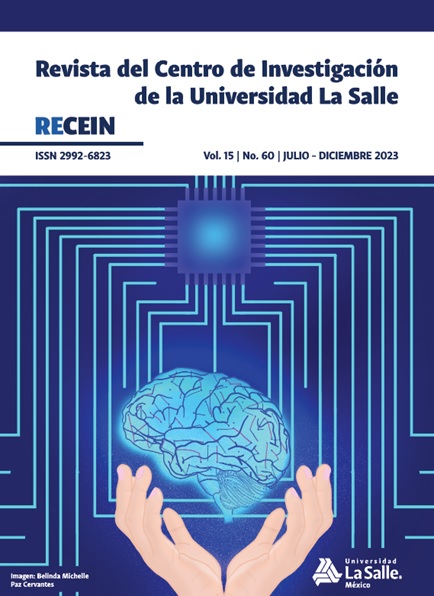Training processes and environmental management: a contribution to education for sustainable development1759
Contenido principal del artículo
Resumen
The objective of this research was to assess the effects of a training process on environmental thinking of teachers at a private university. We worked with the methodology of social representations, mixed approach, in a sample of 20 teachers. Data were analyzed using frequency tables and graphs, content analysis and natural semantic networks. The results show that teachers share reduced, anthropocentric-technical and globalizing social representations. The representation field focuses on nature, its care and administration. This research has implications for teaching; it demonstrated the importance of developing training processes for an adequate approach to environmental and sustainability issues in a teaching team. A limitation of the research was found in the contingency conditions due to the COVID-19 pandemic. The study concludes that updating processes on environmental issues are a resource to enrich teachers' ideas and arouse their interest in education for sustainable development.
Descargas
Detalles del artículo

Esta obra está bajo una licencia internacional Creative Commons Atribución-NoComercial-CompartirIgual 4.0.
Esta revista se encuentra bajo la licencia de Creative Commons, por tanto, los autores, al postular su artículo, lo adhieren a dicha licencia.El autor puede disponer de su artículo para su archivo en repositorios institucionales o en páginas web personales, con la referencia y agradecimientos a la fuente donde se ha publicado.
Citas
Batel, S., Castro, P., Devine-Wright, P. y Howarth, C. (2016). Developing a critical agenda to understand pro-environmental actions: contributions from Social Representations and Social Practices Theories. Wires Climate Change, 7(5), 727-745. https://doi.org/10.1002/wcc.417
Begum, A., Jingwei, L., Haider, M., Ajmal, M. M., Khan, S., y Han, H. (2021). Impact of Environmental Moral Education on Pro-Environmental Behaviour: Do Psychological Empowerment and Islamic Religiosity Matter? International Journal of Environmental Research and Public Health, 18(4), 1604. https://doi.org/10.3390/ijerph18041604
Berglund, T., Gericke, N. y Chang-Rundgren, S.N. (2014). The implementation of education for sustainable development in Sweden: investigating the sustainability consciousness among upper secondary students. Research in Science & Technological Education, 32(3), 318-339. https://doi.org/10.1080/02635143.2014.944493
Benayas, J., Marcen, C., Alba, D., y Gutiérrez, B. J. (2017). Educación para la Sostenibilidad en España. Reflexiones y propuestas. OPEX.
Collazo-Expósito, L., y Granados-Sánchez, J. (2020). Implementation of SDGs in University Teaching: A Course for Professional Development of Teachers in Education for Sustainability for a Transformative Action. Sustainability, 12(19), 8267. https://doi.org/10.3390/su12198267
Escoz-Roldán, A., Gutiérrez-Pérez, J., y Meira-Cartea, P. (2019). Water and Climate Change, Two Key Objectives in the Agenda 2030: Assessment of Climate Literacy Levels and Social Representations in Academics from Three Climate Contexts. Water, 12(1), 92. https://doi.org/10.3390/w12010092
Ferrari, E., Ballegeer, A.-M., Fuertes, M. A., Herrero, P., Delgado, L., Corrochano, D., Andrés-Sánchez, S., Marc Bisquert, K., Garcia-Vinuesa, A., Meira, P., Martinez, F., y Ruiz, C. (2019). Improvement on Social Representation of Climate Change through a Knowledge-Based MOOC in Spanish. Sustainability, 11(22), 6317. https://doi.org/10.3390/su11226317
Fuertes-Camacho, M., Graell-Martín, M., Fuentes-Loss, M., y Balaguer-Fàbregas, M. (2019). Integrating Sustainability into Higher Education Curricula through the Project Method, a Global Learning Strategy. Sustainability, 11(3), 767. https://doi.org/10.3390/su11030767
Hamón, L. A. S., Martinho, A. P., Ramos, M. R., y Aldaz, C. E. B. (2020). Do Spanish Students Become More Sustainable after the Implementation of Sustainable Practices by Universities? Sustainability, 12(18), 7502. https://doi.org/10.3390/su12187502
Kadji-Beltran, C., Zachariou, A. y Stevenson, R. (2012). Leading sustainable schools: Exploring the role of primary school principals. Environmental Education Research, 19(3), 303–323. https://doi.org/10.1080/13504622.2012.692770
Kanyimba, A.T., Richter, B.W. y Raath, S.P. (2014). The effectiveness of an environmental management system in selected South African primary schools. Journal of Cleaner Production, 66(1), 479-488. https://doi.org/10.1016/j.jclepro.2013.10.052
López, F. (2002). El análisis de contenido como método de investigación. Revista Internacional de Investigación e Innovación Educativa, 21(4), pp. 167-179. http://www.uhu.es/publicaciones/ojs/index.php/xxi/article/view/610
Marcos-Merino, J. M., Corbacho-Cuello, I., y Hernández-Barco, M. (2020). Analysis of Sustainability Knowingness, Attitudes and Behavior of a Spanish Pre-Service Primary Teachers Sample. Sustainability, 12(18), 7445. https://doi.org/10.3390/su12187445
Maurer, M. y Bogner, F.X. (2019). How freshmen perceive Environmental Education (EE) and Education for Sustainable Development (ESD). PLoS ONE, 14(1): e0208910. https://doi.org/10.1371/journal.pone.0208910
Mayring, P. (2014). Qualitative Content Analysis: Theoretical Foundation, basic procedures and software solution. Gesis. http://nbn-resolving.de/urn:nbn:de:0168-ssoar-395173
Meira-Cartea, P.A., Gutiérrez-Pérez, J., Arto-Blanco, M. y Escoz-Roldán, A. (2018). Influence of academic education vs. common culture on the climate literacy of university students/Formación académica frente a cultura común en la alfabetización climática de estudiantes universitarios. Psyecology, 9, 301–340. https://doi.org/10.1080/21711976.2018.1483569
Mireles, O. (2019). Representación social de la excelencia académica. Un estudio en el posgrado de la UNAM. Instituto de Investigaciones sobre la Universidad y la Educación/UNAM.
Morote, Á.-F. y Hernández, M. (2020). Social Representations of Flooding of Future Teachers of Primary Education (Social Sciences): A Geographical Approach in the Spanish Mediterranean Region. Sustainability, 12(15), 6065. https://doi.org/10.3390/su12156065
Moscovici, S. (1979). El Psicoanálisis, su imagen y su público. Huemul.
Müller, U., Lude A. & Hancock, D. R. (2020). Leading Schools towards Sustainability. Fields of Action and Management Strategies for Principals. Sustainability, 12(7), 3031. https://doi.org/10.3390/su12073031
Murphy, B.M., Smith, G., Kelly, O., Pitsia, V. & Martinez, G. (2021). The influence of a teachers’ professional development programme on primary school pupils’ understanding of and attitudes towards sustainability. Environmental Education Research, 27(7), 1011-1036. https://doi.org/10.1080/13504622.2021.1889470
Olsson, D., Gericke, N. y Chang Rundgren, S.N. (2015): The effect ofimplementation of education for sustainable development in Swedish compulsory schools– assessing pupils’ sustainability consciousness, Environmental Education Research, 22, 176-202. https://doi.org/10.1080/13504622.2015.1005057
Organización de las Naciones Unidas (2015). Transformar nuestro mundo: Agenda 2030 para el Desarrollo Sostenible. Resolución adoptada por la Asamblea General el 25 de septiembre de 2015. Retrieved from
Organización Internacional de Normalización. (2015). Sistemas de Gestión Ambiental. Requisitos con orientación para su uso, (ISO 14001), 2015. ISO. Retrieved from https://www.nueva-iso-14001.com/pdfs/FDIS-14001.pdf
Ortega-Sánchez, D., Alonso-Centeno, A., & Corbí, M. (2020). Socio-Environmental Problematic, End-Purposes, and Strategies Relating to Education for Sustainable Development (ESD) through the Perspectives of Spanish Secondary Education Trainee Teachers. Sustainability, 12(14), 5551. https://doi.org/10.3390/su12145551
Pauw, J. y Petegem, P. (2013). The effect of eco-schools on children’s environmental values and behavior. Journal of Biological Education, 47(2), 96-103. https://doi.org/10.1080/00219266.2013.764342
Pauw, J., Gericke, N., Olsson, D., & Berglund, T. (2015). The Effectiveness of Education for Sustainable Development. Sustainability, 7(11), 15693–15717. https://doi.org/10.3390/su71115693
Sayan, B y Kaya, H. (2016) Assessment of the environmental risk perceptions and environmental attitudes of nursing students. Contemporary Nurse, 52(6), 771-781. https://doi.org/10.1080/10376178.2016.1254051
Taddei, J. (2011). Cómo avanzar hacia la sustentabilidad en las instituciones de educación superior (SGSU). Jorale Editores.
Terrón, E. & González, E. (2012). Representaciones sociales de la educación ambiental. Influencia de los discursos ambientales en las representaciones construidas y sus implicaciones educativas. Editorial Académica Española.
Organización de las Naciones Unidas para la Educación, la Ciencia y la Cultura (2017). Educación para los Objetivos de Desarrollo Sostenible. Objetivos de aprendizaje. Retrieved from https://web.unican.es/unidades/igualdad/SiteAssets/guia-de-recursos/responsabilidad-social-universitaria/EdS_ODS.pdf
Valackienė, B. y Kairienė, B. (2019). Students’ Participation in Search for Sustainability: A Case Study from Lithuania. Journal of Teacher Education for Sustainability, 21(2), 56-72. https://doi.org/10.2478/jtes-2019-0017
Varela-Losada, M., Arias-Correa, A., Pérez-Rodríguez, U., y Vega-Marcote, P. (2019). How Can Teachers Be Encouraged to Commit to Sustainability? Evaluation of a Teacher-Training Experience in Spain. Sustainability, 11(16), 4309. https://doi.org/10.3390/su11164309
Vilchis, T.E, Aparicio, J. L. y Rodríguez, C. (2021b). Representaciones sociales de la gestión ambiental, construcción desde la nueva normalidad. En Alejandro Díaz-Cabriales (coord.). Educación, Innovación y Nueva Normalidad (pp. 386-395). Asociación Normalista de Docentes Investigadores, A.C.
Vilchis, T.E., Aparicio, J.L., Terrón, E., Rodríguez, C., & Arellano, H.J. (2021a). Representaciones sociales de la gestión ambiental para la sustentabilidad en una comunidad escolar privada. Revista Iberoamericana para la Investigación y el Desarrollo Educativo, 12(23). https://doi.org/10.23913/ride.v12i23.1095
 English
English


